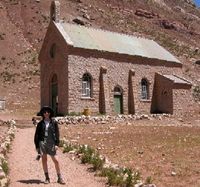Earth Day musings
One thing my sister and I have in common is that economics was our worst subject in college. I actually had to take more economics in graduate school, although MoxieVanilla was smart enough to pick a subject that didn't require it.
Moxie, who is one sharp cookie, has nonetheless been carrying around a vague sense of her own stupidity as a result of being unable to grasp economics, and I have been trying to reassure her that she doesn't understand economics because it doesn't make sense. People try to pretend economics is a science, like physics, but please - it's totally value-laden while pretending to be objective. We're talking about a discipline that says:
- people getting cancer = economic growth (because of medical services consumed)
- cleaning a toxic waste dump = economic cost
It's a big shell game. I can admit a little room for the value-add of genuine artistic talent, or intellectual discovery. But that's about it. Wealth is only "created" within the confines of a small canvass, because in the big picture you eventually hit the first law of thermodynamics, i.e., The Big Shell Game.
There's an article in this month's Harper's about the real estate bubble, and it has one of my all-time favorite factoids that demonstrates the inherent absurdity of economics as a "science:" If you had one penny the day Jesus was born, and you were somehow able to put it in the bank and earn 5% annual compounded interest - today you would have a solid gold sphere 150 million times the size of the Earth.*
Indefinite growth is a myth. Unending wealth creation is a myth. The sooner we accept it, the better off the whole planet will be.
*For a variant on this argument, see Garret Hardin, Living Within Limits, Oxford University Press 1993. He makes the argument that if the 30 silver coins allegedly received by Judas for betraying Jesus were converted to gold and put in the bank for 2000 years at 5% interest, they would grow to the equivalent of 4.78 x 10-to-the-42nd grams of gold - or 8 x 10-to-the -14th solid Earths of gold.

1 comment:
Hardin is an excellent tonic to hubris. Much like Kant or Lucretius, he shows the extent AND boundaries to which something, especially economics, applies. He brings you to ask "and then what?," which can prevent one from aspiring to own a block of gold larger than the earth.
ee
Post a Comment